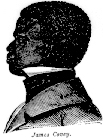James Covey was "stolen by a black man" from his Sierra Leone village at age 12 and taken to the notorious slave factory of Lomboko, where he was placed on a slave ship bound for Cuba. The slave ship was intercepted by a British cruiser, and Covey and the other Africans were freed. Covey later decided to enlist as a sailor on a British man-of-war, the Buzzard.
In June of 1839, the Buzzard was in port at New York harbor when Yale professor Josiah Gibbs was walking the waterfront looking for Mende speakers. Gibbs found 21-year-old James Covey. Covey was taken to New Haven where he met with the African captives of the Amistad. Great excitement and confusion erupted when the captives realized that a fellow Mende, who could also speak English, had arrived at their jail.
Covey soon discovered that all but two or three of the captives spoke Mende, that they were familiar with the rivers of his homeland, and that all agreed where and when they commenced their trip across the Atlantic. After his jailhouse interviews with the captives, Covey was taken to the home of a New Haven resident sympathetic to the abolitionist cause. Covey stayed in New Haven for four months until he provided critical testimony at the January, 1840 civil trial in Hartford. Covey testified as to his interviews in the New Haven jail, then interpreted for Cinque and others as they told their own stories of kidnap, terror, and mutiny.
Covey was aboard the Gentleman as it sailed in November, 1841 for Africa with the surviving Africans of the Amistad.

